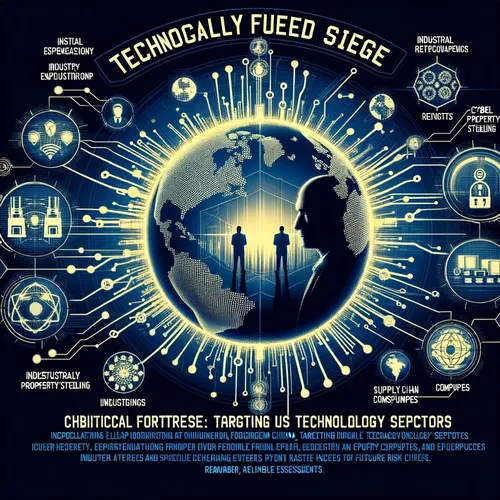Silicon's Red Spy Games: China Hacks the Pentagon via Microsoft's Backdoor Blunder!
- Author
- Quiet. Please
- Published
- Mon 21 Jul 2025
- Episode Link
- https://www.spreaker.com/episode/silicon-s-red-spy-games-china-hacks-the-pentagon-via-microsoft-s-backdoor-blunder--67059223
This is your Silicon Siege: China's Tech Offensive podcast.
Silicon Siege is heating up, and listeners, there’s no snooze button for the U.S. tech sector as China’s cyber offensive storms through the past two weeks. I’m Ting, equal parts hacktivist-whisperer and dumpling connoisseur, here to walk you through the wildest chapter yet in the Sino-American techno-thriller.
Let’s jump right into the blockbuster: The Pentagon is in DEFCON facepalm mode after an explosive ProPublica report revealed Microsoft’s questionable practice of using China-based engineers for U.S. Defense Department cloud services. The ‘digital escort’ model was supposed to keep things safe by having U.S. citizens act as the human firewall between Chinese engineers and top-secret data, but the problem? Many of these escorts apparently knew less about cybersecurity than my Aunt Linda. According to Defense Secretary Pete Hegseth, this triggered an immediate, Pentagon-wide review, aiming for a two-week sprint to sniff out similar digital backdoors elsewhere. Microsoft, facing scrutiny and a Twitter cross-examination from Senator Tom Cotton, quickly pledged: no more China-based engineering teams for any Pentagon workloads.
Don’t get too comfortable, though. As Asia Times pointed out, this is just the latest whack-a-mole in a longstanding battle with Chinese state-backed industrial espionage. A decade-old legacy system, complacently patched by the cheapest coder available, could be all it takes for a critical vulnerability to leak gigabytes of military gold. Remember the F-35 jet design disappearing act and China debuting a rival stealth fighter at record speed? Coincidence? No, just an encore in China’s deep playbook of supply chain infiltration.
Industry pros—think Will Townsend of Moor Insights—estimate the sudden switch to U.S.-cleared tech support could balloon operating costs by 20-30%. But as the recent Salt Typhoon cyberattack reminded us, the stakes are national security, not just next quarter’s profit margin. The Federal Communications Commission, led by Brendan Carr, is now clamping down on Chinese components in subsea cables, further amping up the heat on supply chains that carry 99% of the world’s internet traffic. Call it Rip and Replace 2.0—costly, complicated, but increasingly non-negotiable.
Meanwhile, Singapore’s recent revelation of cyberattacks on its critical infrastructure by China-linked UNC3886 shows the offensive is global. Mandiant, Google’s cyber sleuths, call UNC3886 one of the most serious espionage groups haunting western tech and defense companies. When I say the siege is everywhere, I’m not just being dramatic.
What’s next? Experts warn the digital front line is shifting fast. Any corner of the supply chain, from satellite networks to telecom routers, could be next—especially when major defense contractors are still juggling international partnerships. The consensus: zero trust, airtight audits, and a ban on foreign engineering in sensitive systems are no longer just best practices—they’re survival tactics.
Thanks for tuning in! Don’t forget to subscribe for more of my deep dives into the cyber abyss. This has been a quiet please production, for more check out quiet please dot ai.
For more http://www.quietplease.ai
Get the best deals https://amzn.to/3ODvOta
